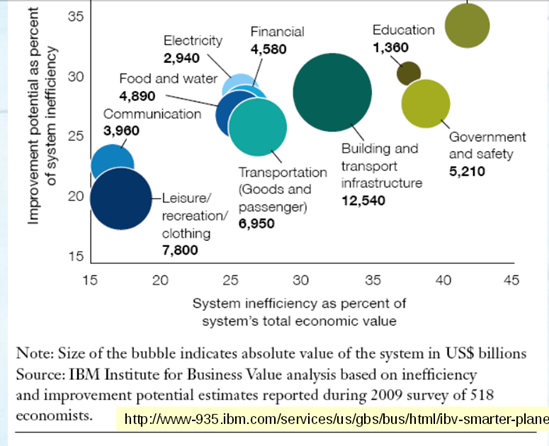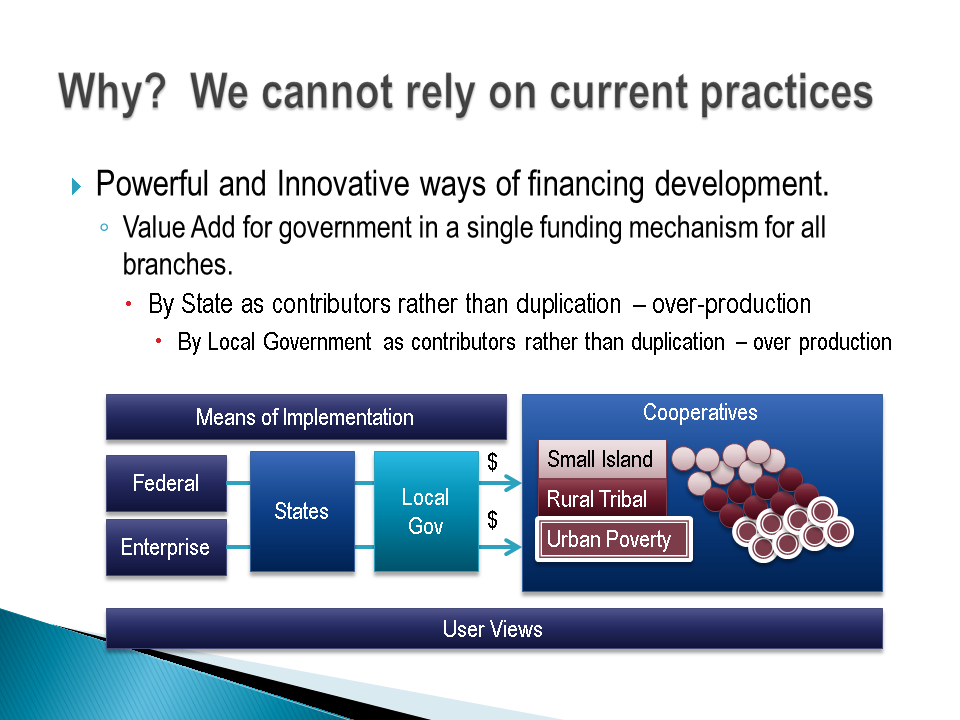Climate Change related to people and planet
Individuals (civil society) and Location on the Planet
A global, international and worldwide issue effecting all people, on all parts of the world or planet. We can assume the problems associated with climate changes are going to effect a person as an individual and their location on the planet.

ICT - Information (context), Communication and Technology
Segment 1. - Responsible (all service providers and supply chain partners with global presence-Private Sector) Sponsors and Service Providers - Changing the conversations beginning at the international levels with those stakeholders who are delivering in a global manner.
Segment 2. - Accountable (Nations>States>local government - Public Sector) for the governance and effective enforcement of policy and laws in ways that differ from the traditional models. Financing through or in innovative ways.
Segment 3. Consulted and Informed (Civil Society) Changing the stakeholders who are the customers or consumers of the benefits and rewards counted by the stakeholders from Segment 1.
Social Media as a Channel
Grassroots - NGOs (new institutes designed for empowering women) an effective use of social media and a new approach to reaching civil society with new innovative delivery systems.
Create all small business incubators with student led shared services into cooperatives similar to the Venato Region plan and model for social innovation in tourism. Under-developed parts of the world have the most dependency on tourism as an industry and the integration with retail and transportation systems will benefit the housing and environmental aspects of transportation.
Poverty Eradication Gap
We are unaware and not close enough to hear the voices from those in non-developed parts of the world. Therefore, our assumptions are bias and flawed.
Dignity Poverty Eradication Return on Investment Benefits
A good indication of the waste would be acquired from Economist convened in an IBM project as shown below.
- Developed or non-developed status and equally when indigenous or tribal populations.
- Developed or non-developed status and the status of laws or lawlessness
- Measuring the population density
- Highest populations are in the non-developed in comparison to developed parts of the planet.
Focus on these populations has the greatest benefit measures towards reduction of poverty.
Doing things the way we have in the past or traditional approaches have the greatest cost and most likely to prevent our poor from having dignity. The human rights of many are harmed by these traditional approaches.
Women and Girls - Equality
All forest are home to under-developed and women farming in rural settings.
Women and Girls are further adversely affected based on the governmental (public) and Industrial/Commercial (private) capital interest which appear to be well intended and are far more serious concerns for under-developed parts of the world.
Example; Laws do not protect women and girls nor are they enforced

ISO and developing countries
International Standards bring technological, economic and societal benefits. They help to harmonize technical specifications of products and services making industry more efficient and breaking down barriers to international trade.
For developing countries, International Standards are an important source of technological know-how. Developing countries can use International Standards to access knowledge in areas where they may lack expertise and/or resources.
In addition, International Standards can improve access to global markets. As they define the characteristics that products and services have to meet on export markets, International Standards help developing countries take part fairly in international trade.
Getting involved in standard development
Developing countries can also benefit from actively taking part in the development of International Standards. Standards are developed in an open process and reflect the views of many stakeholders including technical experts, government representatives, academics and consumers. Being actively involved in this process brings widespread benefits, including:
- influencing the technical content of standards to make sure they reflect specific needs
- gaining hands on experience in standardization work that can help build up national infrastructures, and
- giving early access to information and technological knowledge
Playing an active role in the ISO community, promoting the national use of International Standards and taking part in their development, helps developing countries realise their full potential.

Video: ISO and developing countries
What does ISO do for developing countries?
With, over three quarters of our 162 members from developing countries, we are committed to helping them get the most out of International Standards.
As part of our Action Plan for Developing Countries, we offer a number of programmes to increase their capacity and involvement in standardization, improve awareness of the benefits and to help strengthen regional cooperation.
Some examples of this include ISO's institutional strengthening project for Myanmar and involvement in a UNIDO project to boost capacity in trade.
We also offer training and educational opportunities through the ISO Academy.
Twinning relationships is one of the actions ISO has taken to support participation from developing country members. A twinning relationship means that members can work together to build capacity of a developing country. For more information please read this Guidance on Twinning (PDF) or contact the Technical Management Board at tmb@iso.org.
Leading ISO’s work on developing countries is DEVCO, ISO’s Committee on developing country issues. Find out more about DEVCO.
ISO's Action Plan maps out how ISO aims to contribute to improving developing countries' economic growth and access to world markets and helping to achieve sustainable development.
Award for young professionals in developing countries
Sponsored by DIN, the German Institute for Standardization, ISO's award for young professionals in developing countries is awarded every two years and aims to encourage engagement by young people in international standardization and raise awareness of the importance of standards in promoting safe and sustainable economic development.
This year's theme was 'Sustainable energy future: How can standards help meet the challenge?', with applicants required to address the issue with research and personal analysis related to their own country.
The winner was Ester Williams, Bureau of Standards, Jamaica. Read her winning entry here.
This 2014 award is now closed. The next competition will be held in 2016.